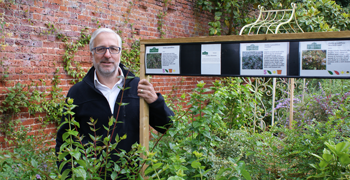Guest blogger and well-known industry consultant Neville Stein advocates bringing 'Grow your own' back down to earth

Over two years since the first ‘lockdown’ that forced us to make the best of our private indoor and outdoor spaces, isn’t it great to see the revived interest and joy in gardening still going strong! Many factors have contributed to keeping this going, not least the variety and availability of gardening shows, podcasts, videos and blogs – all full of inspiration, ideas, knowledge and enthusiasm. It is now possible to find almost bespoke pre-recorded gardening advice and solutions no matter what form of outdoor space you have, or what you want to do with it. Quite often this advice is from amateur gardeners who just want to share their skills, which may also explain why ‘grow your own’ has maintained its popularity – it’s so relatable, like neighbours and friends swapping tips, comparing produce, and even proudly competing in the local produce competition at the village fete. ‘Grow your own’ is almost part of the nation’s psyche, but what is it’s future - and is that future secure?
The field to fork movement, - supported by many celebrity chefs – has been instrumental in raising our awareness of the quality and origins of the food we eat, with many well-known restaurants developing kitchen gardens and using seasonal foods. People began to grow their own food again, citing concerns about pesticides, freshness, food miles ect. Perhaps the flaw however was that the movement appealed more to those who dine out, or those who have space, time and resources to grow the more exotic produce often favoured by the chefs involved. Grow your own maybe stopped being so down to earth.
Small incomes and time pressures
Many who have embraced the ‘grow your own culture’ do seem to be on comfortable incomes, can afford the tools and products needed to tend their plots or gardens, and generally have more free time they can devote to their gardens. But what about those on smaller incomes and those leading time pressured lives? How can we alter the accessibility of ‘Grow Your Own’ to a wider range of people? With the rising cost of living, grow your own now needs to be genuinely financially viable for people, and not just a lifestyle choice based on ethical, health or environmental concerns. Years ago of course it was the economic money saving choice, but let’s face it that is not always the reality now. People have less outdoor space (if any), and maybe less free time, while the costs involved such as water, composts, fertilisers have all risen. Yes, there are deals to be had, but how can a person with no car capitalise on the 3 for 2 bags of compost deal for example?
Changing perceptions
So here is the real marketing opportunity, - getting these people into gardening and growing their own produce. How do we do this? Both by changing the perception that it’s not for them, and by making it more practically and economically achievable. Costs of all gardening products will almost certainly be rising, but perhaps there an opportunity for ‘value’ ranges of seeds plants and sundries to be introduced? The increase in sales should mitigate the reduced value of sale. Could we be selling more substantial grow your own welcome packs, including heavier items, that can be delivered free to the customer with no transport? Could we offer a basic gardening tool hire service for those without the bare essentials, or even sell second hand tools? As an industry we need to make grow your own as simple and accessible as possible, so ranges could be grouped into easy maintenance for those with less time, most resilient for the new gardener, space saving for small plots or just balconies, etc. We need user friendly guides, (and staff!), recipes for end results, and of course to push the benefits of growing your own food to physical and mental wellbeing. The time pressured gardener could be encouraged to swap the gym for the garden with the same health benefits!
Be creative and committed
Looking wider, our sector could also petition the government to provide more allotment space, or give incentives such as discounts, loyalty schemes, talks and training to get community groups or local housing associations into gardening. We need to be creative and committed.
Life sadly does seem to be getting even more complicated, so let’s help people reconnect with something simple. Let’s bring grow your own back down to earth again and promote something that really can bring financial, health, and environmental benefits. The message should be that it’s for everyone and at every level, – even if it’s just a tomato plant on a balcony, it’s a start.
